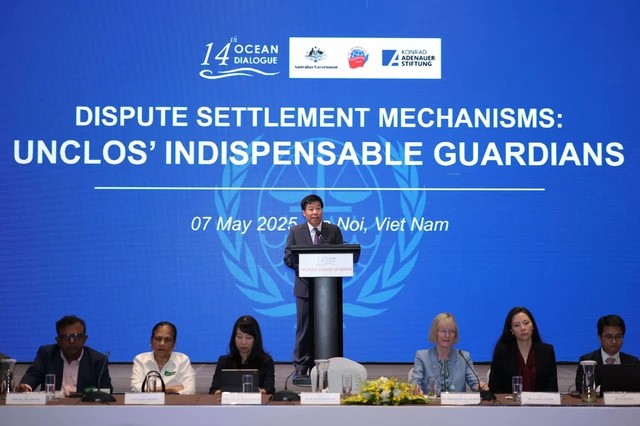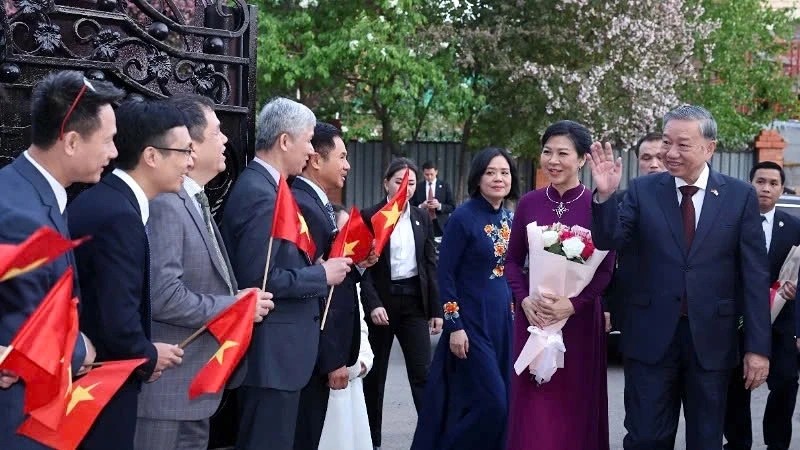Vietnam ranks 6th in Climate Risk Index ranking
Vietnam ranks 6th globally in the most up-to-date Climate Risk Index ranking released by Germanwatch, the highest of any ASEAN country.
Pham Van Tan, deputy head of the Climate Change Department, Vietnam’s Ministry of Natural Resources and Environment (MoNRE), presents the ministry’s response to climate change threats to the country
Germanwatch released the ranking, which analyses the extent to which each country has been affected by weather-related loss events, at the 24th Conference of the Parties to the United Nations Framework Convention on Climate Change (COP24) on December 4 in Katowice, Poland.
Germanwatch is an NGO based in Bonn, Germany, also the home of the UN Framework Convention on Climate Change (UNFCCC). For 27 years, it has been engaged in environment and development issues, seeking to influence national policy and North-South relations.
In the ranking, Vietnam was followed by Thailand at number 10. This is the result of storms, typhoons and droughts in 2017, which killed 298 people.
The deadliest one, Typhoon Damrey, hit Vietnam in November and killed at least 106.
2017 was an exceptionally intense year for tropical cyclones, according to Germanwatch Policy Adviser for Climate Risk Management Lena Hutfils. “Many countries are hit very frequently, so they don’t have an opportunity to recover in time,” Hutfils said.
She also drew attention to how eight out of the top ten countries are from low- or middle-income groups.
David Eckstein, the organisation’s Policy Adviser for Climate Finance and Investment, explained that the index consists of two components: one which looks at data from the previous year, and one which incorporates a 20-year development. Data includes direct short-term and long-term linkages between climate change and meteorological events.
“[The index] should be understood as a warning signal,” Eckstein said. Furthermore, it provides crucial evidence to support the story that climate change and annual increases in storms, typhoons, floods, are linked.
Eckstein hopes that this would translate into action from national governments, not only to deal with the impact once it happens but also do more planning in advance.
Responding to these recent developments at COP24, Pham Van Tan, deputy head of the Climate Change Department, Ministry of Natural Resources and Environment (MoNRE), declared that climate change adaptation would be “the number one priority.”
Tan noted how Vietnam’s Government was one of the first to pass an implementation framework for the Paris Agreement on climate change, nearly a month before the agreement itself went into effect in 2016. A key part of this plan is the constant review, submission and implementation of Nationally Determined Contribution (NDC), each country’s objectives for mitigation measures.
At COP24’s Session on ASEAN NDC Partnership, Tan stated that 47 of Vietnam’s 63 provinces had already submitted concrete implementation plans for the Paris Agreement. Vietnam is “among the most advanced in ASEAN” in terms of NDC implementation, according to the Vietnamese official. His claim is supported by many in the international community, who raised questions during the session to learn from Vietnam’s policies.
The NDC Partnership’s Country Engagement Director Jahan Chowdhury commended Vietnam on its effective coordination between the government’s supreme leadership, Ministries and civil-society actors for better climate change adaptation. According to Tan, MoNRE meets with NGOs once every three months to discuss the implementation of policies at the grassroots level.
He has high expectations for the outcome of COP24, the most important gathering of international negotiators on the issue of climate change.
He wants to see how much support Vietnam will be able to obtain from the international community following MoNRE’s proposal for Greenhouse Gases Reduction plan.
“Support” is hereby defined as a combination of three things: finance, technology transfer and capacity building. So far, Vietnam has not received any pledges from developed countries with regards to financial support, a major concern.
VNF/VNS
Recommended
 National
National
Vietnam News Today (May 13): Vietnam Maintains High Human Development Index Despite Global Slowdown
 National
National
Vietnam News Today (May 12): Party General Secretary Meets With Russian Experts, Intellectuals
 National
National
Vietnam News Today (May 11): Vietnam, Austria to Boost Cooperation in High-Tech Development, Innovation
 National
National
Vietnam News Today (May 10): Vietnamese Peacekeepers Honored with UN Medal in South Sudan
Popular article
 National
National
Vietnam News Today (May 9): Vietnam Ready to Work With Russia to Elevate Relations
 National
National
Vietnam News Today (May 8): Vietnam Remains Committed to UNCLOS
 National
National
Vietnam News Today (May 7): Vietnam Hosts Over 7.67 Million International Visitors in First 4 Months
 National
National



